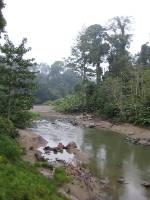 There are three different teams of scientists from across the Life Sciences department of the Museum who have travelled to work in Sabah on our current trip to Borneo. The first team is collecting parasitic wasps (Hymenoptera) and beetles (Coleoptera). The second is sampling freshwater invertebrates. The third (known as the Quantitative Inventory - i.e. QI - team), of which I am a member, is sampling soil and leaf litter invertebrates and lichens.
There are three different teams of scientists from across the Life Sciences department of the Museum who have travelled to work in Sabah on our current trip to Borneo. The first team is collecting parasitic wasps (Hymenoptera) and beetles (Coleoptera). The second is sampling freshwater invertebrates. The third (known as the Quantitative Inventory - i.e. QI - team), of which I am a member, is sampling soil and leaf litter invertebrates and lichens.
The teams are visiting a number of different areas in Sabah. We will spend the first week in Danum Valley Conservation Area in the east of Sabah. Teams will also visit Maliau Basin Conservation Area, the SAFE project area, the area around Sandakan and the freshwater team will also be visiting ponds and lakes near to Kota Kinabalu, Sabah’s capital.
The total length of the trip is 6 weeks, but only the QI team will be in Sabah for the entire period.
This is an extraordinary opportunity to document the diversity of tropical rainforests and tropical freshwaters. We will almost certainly discover new species and in some cases as much as 50% of or samples will be species new to science.
In later posts I will explain a bit more about what the QI team is doing, the techniques we are using and the sorts of invertebrates we are collecting. So come back soon to find out more.
Dan Carpenter


